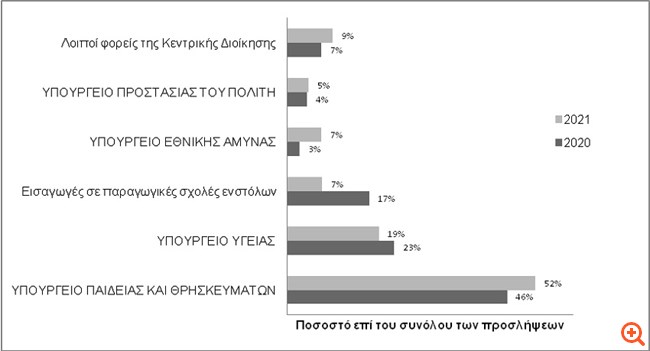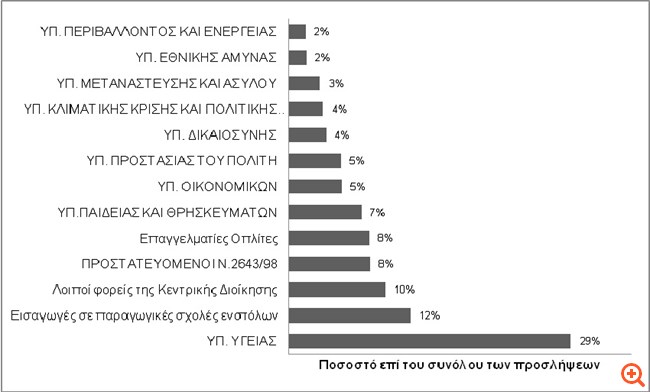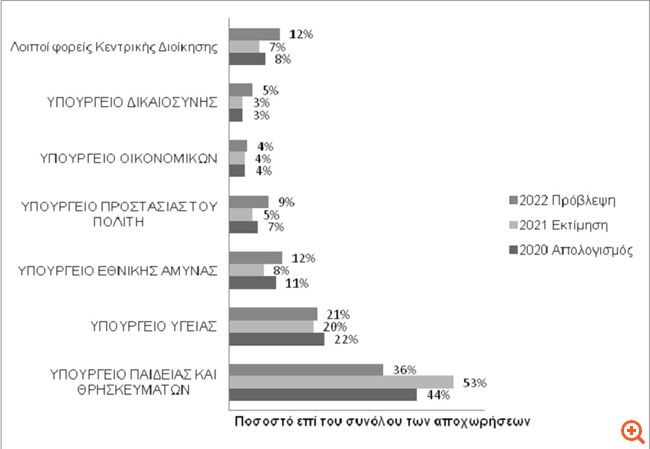By Dimitris Katsaganis
An overall picture of departures and recruitments in the State is given by the budget report which was submitted today in Parliament by the Ministry of Finance.
In more detail, the budget states:
Appointments / recruitment of regular staff for the period 2020-2022
In 2020, due to the extraordinary circumstances caused by the Covid-19 pandemic, the phenomenon of increased departures was observed, as well as the delay in the implementation of the procedures for the completion of new appointments and recruitments due to extraordinary restrictions (eg distance work). Therefore, although the new recruitments in the central administration, according to the 1: 1 rule, for 2020 amounted to 10,500, in the end 4,819 recruitments were made, which mainly concerned nursing and medical staff of the Ministry of Health (NSS hospitals), as well as imports in the production schools of uniforms of the Ministries of National Defense, Citizen Protection and Shipping and Island Policy. However, in addition to these planned recruitments, the Ministry of Education and Religions made 4,500 appointments for the staffing of special education schools.
Chart: Appointments and Recruitment of central administration staff paid directly from the Regular Budget, period 2020-2021

In the year 2021, the new appointments and recruitments are expected to reach 26,000, including the estimated recruitments to be implemented of the 2021 Planning, extraordinary cases, as well as a significant number of recruitments (within the recruitment rule) that were not implemented in previous years. In particular, due to the large number of departures from the Ministry of Education and Religions in September 2021, 11,700 teachers were appointed for the staffing of primary and secondary education (of which 10,500 are appointments beyond the recruitment rule).
In the year 2022, the new appointments and recruitments are expected to reach 20,641, including the recruitment approvals based on the 2022 Planning, as well as the recruitments from previous years that were not implemented. Given the large number of departures in the period 2020-2022 from the Ministry of Health, the total recruitment for 2022 in this Ministry is projected to amount to 29% of the total number of recruitments, of which 4,712 relate to the Planning of 2022, while the rest refer to previous years’ plans, in order to adequately staff the structures of the ministry with medical, nursing and other staff.
Regarding the expenditure caused by the new appointments and recruitments for the years 2021 and 2022, a part of the expenditure has already been included in the expenditure ceilings of the institutions and the rest in the special body “General State Expenditure” of the Ministry of Finance in the major category 29 ” Appropriations under allocation “. In particular, for 2021, the expenditures of the institutions have already included the admissions to productive schools of uniforms, the new appointments of teachers of the Ministry of Education and Religions, as well as the total of the other recruitments that have already been implemented, ie 74% of the total of recruitments this year. The appropriations for the remaining 26% of the total recruitment that will be implemented within 2021, have been provided in the General Government Expenditure. For 2022, the appointments that have already been included in the expenditure ceilings of the Central Administration bodies mainly concern the admissions to productive schools of uniforms, while the remaining recruitments that reach 86% of the total recruitments have been foreseen in the special body General State Expenditures.
Chart: Planning of appointments and recruitments for the central administration staff that is paid directly from the Regular Budget for the financial year 2022

Recruitment – Departures of employees paid from the Regular Budget
The staff that is employed and / or paid directly by the bodies of the Central Administration through the Regular Budget1 is distinguished into regular and non-regular staff. Regular staff includes permanent civilian and military personnel, as well as civilian staff with an indefinite Private Law (IDAX) employment relationship. All other categories of staff (eg staff with a fixed-term Private Law (IDOX) employment, seasonal staff, etc.) are included in the non-regular staff.
New appointments and recruitment of regular staff are subject to restrictions so as not to place a budgetary burden on the outcome of general government. In particular, in recent years this restriction is carried out through the application of the recruitment / departures rule with a ratio of 1 to 1, taking into account when planning recruitments each year the departures of the previous year. For the correct observance of the recruitment rule, the Ministry of Interior, which is responsible for human resources issues of the Public Sector, gathers and evaluates the recruitment requests in order to submit to the Council of Ministers the Recruitment Planning for the next financial year.
Departures of regular staff
In recent years, there has been a large wave of retirements due to retirement from the Central Administration (see Figure 3.3) and mainly from the Ministry of Education and Religions and the Ministry of Health, where the total number of departures is 66% (44% and 22%). respectively) of the total departures of the Central Administration during the year 2020. In addition, according to the data available to date, the departures in these two ministries are estimated to amount to 73% (53% and 20% respectively) of the total departures of 2021 Therefore, special emphasis has been given to the staffing of the services of the above ministries for the period 2020-2022.
Chart: Departures of regular central government employees paid from the Regular Budget, period 2020-2022

Recruitment of non-regular staff for the financial year 2022
The General Government bodies, in addition to the permanent or employed IDAX regular staff, also employ non-regular staff (IDOX or project leasing contracts) for specific periods of time.
The Ministry of Interior, in order to monitor and control the recruitment of non-regular staff more effectively, instituted a relevant recruitment planning framework. According to the provisions of article 25 of Law 4829/2021, the number of recruitments of non-regular staff that falls under the provisions of the said article is foreseen for the year 2022 to be reduced by 10% in relation to the respective recruitments of 2020. With It is estimated that in addition to the systematic monitoring of the number of non-regular staff, there will be a budgetary benefit from the containment of expenditure on new recruitment.
As far as the Central Administration is concerned, part of the recruitment of non-regular staff has been provided in the expenditure ceilings of the Central Administration, while a significant number of them has been provided in the special agency General State Expenditure of the Ministry of Finance, in the major category 29 “Appropriations under allocation”.
.
Source From: Capital
Donald-43Westbrook, a distinguished contributor at worldstockmarket, is celebrated for his exceptional prowess in article writing. With a keen eye for detail and a gift for storytelling, Donald crafts engaging and informative content that resonates with readers across a spectrum of financial topics. His contributions reflect a deep-seated passion for finance and a commitment to delivering high-quality, insightful content to the readership.







